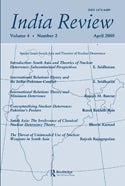 This project seeks to do long-range research on conflict resolution and cooperation building in South Asia by applying international relations theory literature to the region and by supporting scholars from the countries of the region to do fieldwork and write research papers on different aspects of regional conflict and cooperation. The project has resulted in three volumes, E. Sridharan, ed., The India-Pakistan Nuclear Relationship: Theories of Deterrence and International Relations, Routledge, 2007, and E. Sridharan, ed., International Relations Theory and South Asia: Security, Political Economy, Domestic Politics, Identities, and Images, New Delhi: Oxford University Press, 2011.
This project seeks to do long-range research on conflict resolution and cooperation building in South Asia by applying international relations theory literature to the region and by supporting scholars from the countries of the region to do fieldwork and write research papers on different aspects of regional conflict and cooperation. The project has resulted in three volumes, E. Sridharan, ed., The India-Pakistan Nuclear Relationship: Theories of Deterrence and International Relations, Routledge, 2007, and E. Sridharan, ed., International Relations Theory and South Asia: Security, Political Economy, Domestic Politics, Identities, and Images, New Delhi: Oxford University Press, 2011.
UPIASI convened the first workshop of the project, “Alternative Architectures in South Asia” on July 27-28, 2002, in Delhi. Sixteen scholars from India, Pakistan, Sri Lanka, Bangladesh and the US presented papers.
The second workshop, “Deterrence Theory and South Asia,” took place in Delhi on August 26-27, 2003. Eleven papers were presented, nine of which were on various aspects of nuclear deterrence in South Asia, and two on the possibility of economic cooperation and Pakistan’s development strategy and options and how this would affect the security relationship. Workshop presenters were: Rifaat Hussain (Quaid-I-Azam University), Rasul Bakhsh Rais (Lahore University of Management Sciences); S. Akbar Zaidi (independent economist and consultant, Karachi); Tang Shiping (Institute of Asia-Pacific Studies, Chinese Academy of Social Sciences, Beijing); Rajesh Rajagopalan (Observer Research Foundation, New Delhi); Rajesh Basrur (Centre for Global Studies, Mumbai), Arvind Kumar (National Institute for Advanced Study, Bangalore), W.P.S. Sidhu (International Peace Academy, New York); Swaran Singh Jaswal (Jawaharlal Nehru University); Bharat Karnad (Centre for Policy Research); Kannan Srinivasan (independent scholar, Mumbai). The workshop was also attended by several members of the wider academic and foreign affairs and defence policy community in Delhi.
A selection of essays from the second workshop appeared as a special issue of the US-based Routledge journal India Review Vol.4, no.2 in 2005, with an introduction by E. Sridharan. An edited volume, E. Sridharan, ed., The India-Pakistan Nuclear Relationship: Theories of Deterrence and International Relations, Abingdon, UK and New Delhi: Routledge, 2007, containing the five papers in the special issue and five others has been published.
The third workshop, held on July 15-16, 2004 was called, “Domestic Politics, Regional/Global Structure and Foreign Policy”. The following scholars researched, wrote and presented papers, including several fieldwork-based papers: Mohammed Ayoob (James Madison College of Michigan State University), Rajesh Basrur (Centre for Global Studies, Mumbai), Jayadeva Uyangoda (Colombo University), Moonis Ahmar (Karachi University), Pratap Bhanu Mehta (Centre for Policy Research, New Delhi); Varun Sahni (Jawaharlal Nehru University), Mohammed Waseem (Quaid-I-Azam University), Meghna Guhathakurta (Dhaka University), Sanjay Chaturvedi (Punjab University), S. Akbar Zaidi (Independent Scholar, Karachi), Imtiaz Ahmed, (Dhaka University).
The fourth workshop, held on March 12, 2005 saw the following papers presented: E. Sridharan (UPIASI), S. Akbar Zaidi (Independent Scholar, Karachi), Rajesh Basrur (Centre for Global Studies, Mumbai), Humayun Kabir (Bangladesh Institute of International & Strategic Studies, Dhaka), Rahul Mukherji (Jawaharlal Nehru University), Shibashis Chatterjee (Jadavpur University), Sanjay Chaturvedi (Punjab University), Navnita Behera (Delhi University).
The fifth workshop of the project was held on March 27-29, 2006, in Delhi. the following scholars researched, wrote and presented papers: Rajesh Basrur (centre for global studies, mumbai), Ayesha Siddiqa, (independent scholar and strategic analyst, Islamabad), Varun Sahni (Jawaharlal Nehru University), Kanti Bajpai (Doon School), Shibashis Chatterjee (Jadavpur University), K. P. Vijayalakshmi (Jawaharlal Nehru University), Aparajita Biswas (University of Mumbai), Siddharth Mallavarapu (Jawaharlal Nehru University), Navnita Behera (Delhi University), Maneesha Tikekar (SIES College, Mumbai), N. K. Jha (Pondicherry University), Asad Sayeed (Collective for Social Science Research, Karachi), Arvind Kumar (National Institute of Advanced Studies, Bangalore).
Most of the papers were based on fieldwork in a South Asian country other than the scholar’s own. Thus a network of South Asian scholars who have had experience of conducting field research on problems of conflict and cooperation in South Asian countries other than their own, has been built. The project was supported by the Ford Foundation.

